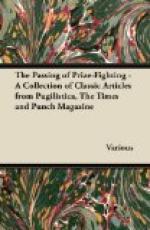Brighton is decidedly a fishing-town, for besides the quantity of John Dorys caught there, it is a celebrated place for pursey half-pay officers to angle in for rich widows. The bait they generally use consists of dyed whiskers, and a distant relationship to some of the “gentles” or nobles of the land. The town itself is built upon the downs—a series of hills, which those in the habit of walking over them are apt to call “ups and downs.” It consists entirely of hotels, boarding-houses, and bathing-machines, with a pavilion and a chain-pier. The amusements are various, and of a highly intellectual character: the chief of them being a walk from the esplanade to the east cliff, and a promenade back again from the east cliff to the esplanade. Donkey-races are in full vogue, insomuch that the highways are thronged with interesting animals, decorated with serge-trappings and safety-saddles, and interspersed with goat-carts and hired flys. There is a library, where the visiters do everything but read; and a theatre, where—as Charles Kean is now playing there—they do anything but act. The ladies seem to take great delight in the sea-bath, and that they may enjoy the luxury in the most secluded privacy, the machines are placed as near to the pier as possible. This is always crowded with men, who, by the aid of opera glasses, find it a pleasing pastime to watch the movements of the delicate Naiads who crowd the waters.
Those to whom Brighton is recommended for change of air and of scene get sadly taken in, for here the air—like that of a barrel-organ—never changes, as the wind is always high. In sunshine, Brighton always looks hot; in moonshine, eternally dreary; the men are yawning all day long, and the women sitting smirking in bay-windows, or walking with puppy-dogs and parasols, which last they are continually opening and shutting. In short, when a man is sick of the world, or a maiden of forty-five has been so often crossed in love as to be obliged to leave off hoping against hope, Brighton is an excellent place to prepare him or her for a final retirement from life—whether that is contemplated in the Queen’s Bench, a convent, a residence among the Welsh mountains, or the monastery of La Trappe, a month’s probation in Brighton, at the height of the season, being well calculated to make any such change not only endurable, but agreeable.




